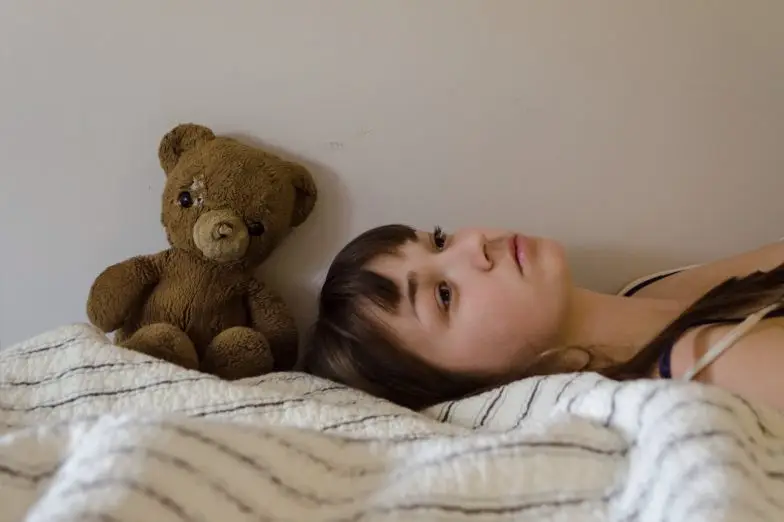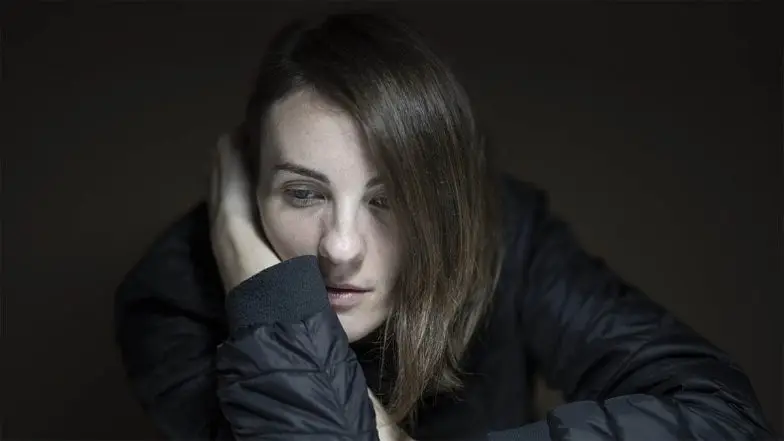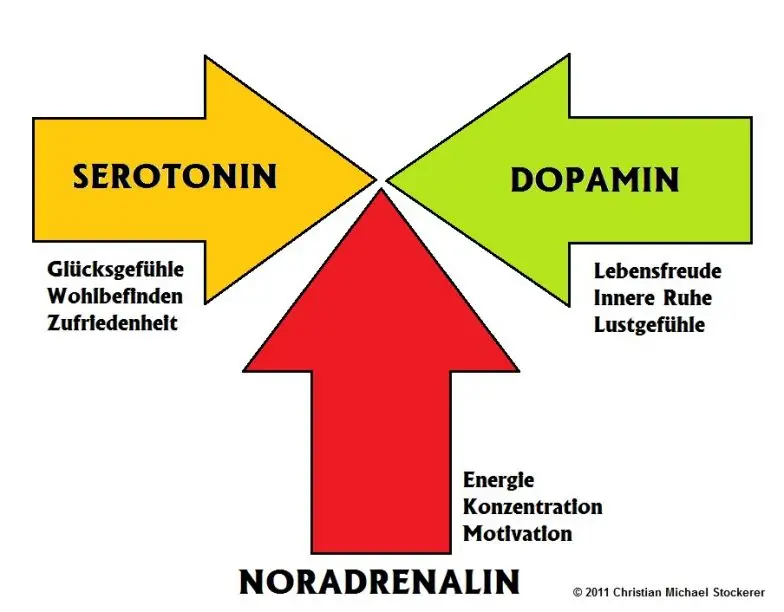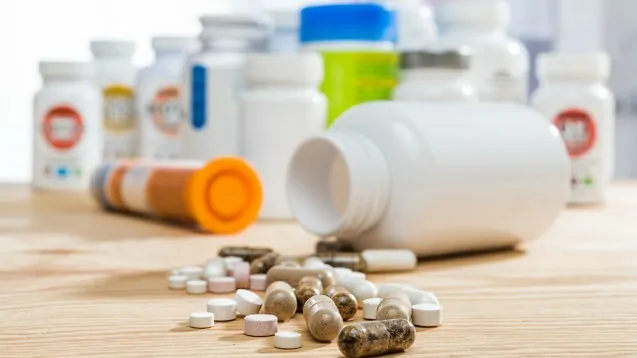Do you suspect have depression?
Then we urgently advise you to read this article.
Why?
There are 5 good reasons for this:
1.) You will receive a free test to find out whether you really suffer from depression.
2.) You will learn the real causes of depression. And Warning: The etiology (root cause) is completely different than you think. (Latest scientific findings 11/2020)
3.) You get free of charge all information about how a depression can be treated causally.
4.) In this article you will only find scientific and proven facts. Checked by our experts using the “peer review process“.
5.) All information is 100% independent. Because we have no economic interest. Our association is fully funded by donations.
Now choose what you are interested in ...
...or just scroll down and read the full article!

Dear reader,
Depression is not only one of the most common mental diseases, but also one of the most underrated diseases. The WHO assumes that:
- Erhard Blanck
Definition: Permanent mental disorder, mainly caused by sadness, lack of interest and Loss of ability to enjoy. In contrast to a temporary “low”, those affected can usually not free themselves from depression.
Are You Really Depressed?
Find out now with our free self-test...
Can you identify with the following statements?
1 I feel depressed, depressed, and sad
2 In the morning I feel exhausted and don't even want to get up
3 I suddenly cry or feel like crying a lot
4 My sleep is disturbed (the type of sleep disturbance does not matter)
5 I eat less than before
6 I don't enjoy sex that much anymore
7 I notice that I am losing weight or the opposite of that: I am gaining weight
8 I am constipated
9 My heart often beats faster than usual
10 I get tired for no reason
11 My thinking is no longer as clear as it used to be
12 Things are no longer that easy for me
13 I am restless and cannot hold still
14 When I look to the future, I see no hope
15 I am more irritable than usual
16 I find it difficult to make decisions
17 I do not think that I am useful and that I am even needed
18 My life feels empty and filled
19 My mind is concerned with death or suicide
20 Today, I no longer enjoy doing things that I used to feel like doing
Scientifically proven:
These signs indicate depression!
Now check for yourself:
How many of the symptoms apply to you?
Depression can easily be confused with
- the fatigue syndrome
- a bipolar disorder or
- a depressive mood.
An important sign of a “real” depression is that the patient’s quality of life and everyday activities are clearly restricted. [3]

Possible symptoms of depression are:
- Listlessness
- Constant fatigue
- listlessness
- Joylessness
- Loss of interest
- insomnia
- Loss of appetite
- Difficulty concentrating
- irritability
- Morning low
- Negative thoughts (often circling)
- forgetfulness
- Inner unrest
- Fear of failure, fear of loss and the future, general fear
- Restriction of communication
- Tinnitus
If 5 of the above symptoms last longer than 2 weeks, this is a very clear sign of depression.
In this case, we recommend that you carry out our online test to get a concrete assessment:
Course of depression
There is no general rule how depression works. Every sick person experiences a different process.[4]
You can divide the gradients into types. We present these here in detail.
The symptoms can vary in their number, timing, severity and duration.
Causes of depression
When it comes to the development of depression, various factors can be decisive. In some cases, patients report a specific event before the outbreak, in others the depression literally arises „out of nowhere“. [5]
The triggers
A distinction is made between biological, genetic and psychosocial triggers. There is still no consensus on how great the influence of the different factors is. [6]
Stressful life events such as:
- A death
- A conflict-ridden partnership
- A seperation
- Constant excessive demands in the workplace
- Negative stress or
- A serious trauma
increase the likelihood of developing depression and can >trigger the disease if other factors are already present. [7] We are now introducing these to you.
Biochemical pathogenesis: This is how depression develops hormonally

Researchers found that a depressed person has an imbalance of the following messenger substances:
- Serotonin and
- Norepinephrine
The hormones are no longer available to the system in sufficient quantities and / or communication between the nerve cells is disrupted. [8]
Sick people could also have an increased value of the stress hormone
- Cortisol
found in the blood and urine, which can adversely affect feelings and thoughts. [9]
What are these hormones and what do they do in the body?
Serotonin
- Influences drive, mood, well-being and sleep. [10]
norepinephrine
- Controls the sleep-wake rhythm, attention, memory and concentration. [11]
Cortisol
- Animal experiments have shown that an increased cortisol level increases anxiety and affects sleep, appetite and the ability to concentrate. [12]
The goal of a causal treatment is to restore the hormone balance in the body.
Important! Please read the following paragraphs carefully...
because this information can change your life extremely for the better
Common cause of depression: parasites in the body
Parasites are able to have a enormous influence on the hormones and thus on the psyche of humans. [13]
Signs of an infestation with parasites are therefore among other things:
- Depression or depressed mood
- Mood swings
- Dejection
- Permanent feeling of stress
- Inner unrest or even
- Aggressiveness and anxiety [14]
You can find out whether parasites are the cause of your depression with our free parasite test:
You should know that!
Parasites can cause depression
A large number of parasites have been shown to be able to manipulate the nervous system of humans and thus to influence behavior. [15] Including, for example, widely common categories like:
- Echinococcus
- Sparganosis
- Paragonimus
- Schistosoma
- Trypanosoma
- Toxoplasma Gondii
- Naegleria fowlerii
- Acanthamoeba histolytica oder
- Balamuthia mandrillaris [16]
Are you interested in the topic of "Parasites and Depression"? Then we recommend you to watch our short explanatory video:
Attention! Parasites can promote depression in 4 ways:
1.) toxic excretions can inflame nerves, which leads to an artificial increase in the cortisol level. The consequence of this is, among other things, the development of chronic stress and nervousness. Main factors in the development of the clinical picture of depression. [17]
2.) Parasites can intervene in the biochemistry of the brain metabolism and influence the dopamine regulation and the serotonin balance. [18]
3.) The fact that parasites inhibit positive bacteria in the intestine can lead to a incorrect intestinal symbiosis. This has a demonstrably negative effect on the psyche. [19]
4.) The withdrawal of nutrients from the food pulp (including tryptophan = serotonin precursor) promotes depression. [20]
Toxoplasma Gondii: A tiny parasite that lives in people's brains can control your behavior and emotions
According to studies, one of the parasites that causes depression is the brain parasite Toxoplasma Gondii. [21] Infected people also show an increased risk to develop further mental disorders and commit suicide more often. [23]
At least 60% of the people living in Germany are already infected with the unicellular organism. [22]
The infection usually occurs through the consumption of contaminated meat, contact with cats, infected tap water or uncleaned vegetables. [24]
More information can be found in our article “Toxoplasma Gondii”
There are ways out of depression:
Treatment and therapy with considerable success
It is now clear that mental disorders such as depression, burnout, anxiety and diseases of the central nervous system ultimately exclusively with the following factors are related:
- A change in the microbiota (intestinal environment)
- A disturbed hormonal system
- A lack of certain nutrients
A parasite treatment can work wonders here because the root causes can be eliminated . [25]
Treat depression yourself with a parasite cure
For many of those affected, a parasite elimination regimen is immediate help. Choosing the right parasite regimen is crucial for success. What the right parasite cure is for you personally, however, is highly individual.
Please choose now...
First of all, I would like to find out more about the parasite cure:
I want to know immediately which is the best parasite cure for me personally:
Healing is possible: check out this field report
We keep getting feedback from users of a parasite cure who report that their depression has significantly improved or was even cured with a parasite cure.
We are allowed to publish feedback in this article:

Means for Depression: A Help for Affected People?

Many people who suffer from depression want quick help in the form of dietary supplements, medicines or medication.
But which means really work?
Vitamin D
Ineffective for treatment
Although several observational studies have already indicated that people with a vitamin D deficiency have an increased risk of developing depression, treatment with the “sun hormone” in a randomized clinical study was ineffective. [26]
L-Tryptophan
No studies yet
Tryptophan is the precursor of the happiness hormone serotonin. Meaningful studies whether it can alleviate the symptoms of depression are missing yet. [27]
Lithium / Serotonin
Can lighten the mood
Lithium is not a classic antidepressant, but is used as a mood stabilizer for depression. It works by affecting the transmission of signals in the brain. Lithium is also said to reduce the risk of suicide. It is often given as a supplement to antidepressants when they do not have the desired effect. Lithium should not be taken in patients with kidney or heart disease. [28]
CBD
Calms and brightens mood
CBD is a cannabinoid and has a mood-enhancing effect. This is beneficial for the concomitant treatment of depression. Compared to conventional antidepressants, the natural plant extract has practically no side effects. Unlike THC, it is not intoxicating. It is noteworthy that anxiety can be relieved by taking CBD. [29]
Johannis herbs
Short-term relief possible
Certain St. John’s wort preparations can relieve mild to moderate depression, at least for a short time. This has not been proven for severe depression. The drugs can cause side effects such as nausea, slight skin irritation, sensitivity to light and headache. [30]
Dietary Supplements for Depression: The Bottom Line
If individual remedies have an effect against depression, then they only represent support in the treatment of depression. They cannot replace a causal therapy.
Parasites are also able to remove substances such as amino acids, trace elements, enzymes and vitamins from the intestine. At a Infestation the substitution is therefore only limited to not at all useful. [31]
Are Medications Really Necessary or Is a Natural Cure Possible?
The active ingredient in antidepressants blocks certain histamine receptors and at the same time activates the docking points for serotonin. This restoration of the messenger substance balance can lead to more equilibrium and a mood improvement. [32]
Important:
However, there is not a causal healing. In addition, the body gets used to the medication. When you stop the depression strikes back with multiple hardness. In such phases it is not uncommon for cases of suicide to occur. [33]
Drugs for depression, such as serotonin reuptake inhibitors, often take several weeks to work. The frequently occurring side effects with a therapy, however, usually show up more quickly:
- Restlessness
- sleep disorders
- dizziness
- Gastrointestinal complaints
- Drowsiness and blurred vision
- Tremors, motor restlessness and muscle weakness
- Weight gain [34]
The 5 most important questions about depression quickly and easily explained by expertsThe 5 most important questions about depression quickly and easily explained by experts
Question 1: What happens in the head when I am depressed?
Research has shown that some neurotransmitter systems in the brain are out of whack during depression. This applies in particular to the transmitter systems for the messenger substances serotonin and norepinephrine.
The concentration of neurotransmitters is either too low or the sensitivity of the receptors on which these messenger substances act is permanently changed. [35]
Question 2: Is Depression Hereditary?
Through studies of twins and family studies, you came to the conclusion that genetic factors can play a role.
Children whose parents are depressed have a 10-15% chance of developing depression themselves. However, a hereditary predisposition does not necessarily mean that you will also get sick. For that too have to other factors be given. [36]
Question 3: What are the biggest risk factors for depression?
Certain experiences and experiences can promote the development of depression.
Such risk factors could be, for example:
- Bullying
- sadness
- sexual abuse
- other traumatic experiences
- Physical or mental illness of the parents
- Experiences of psychological violence
Strokes of fate - Cancer (Depression is the most common comorbidity) Prevalence 5 – 46% [37]
Question 4: Can you get depression from taking antibiotics?
The package insert for certain antibiotics contains the Depression as a side effectalready listed. [38]
The reason for this is that antibiotics kill pathogenic bacteria as well as health-promoting intestinal bacteria, which can lead to a intestinal symbiosis. [39]
Studies show that the intestinal environment and psyche are directly correlated. [40] Among other things because intestinal bacteria produce the amino acid tryptophan, which is a building block in the brain for the formation of the neurotransmitter serotonin. [41]
Also those formed by certain positive intestinal bacteria short chain fatty acids can after recording through the intestines to the brain reach. In animal experiments, the fatty acids, as they are abundantly formed by bacteria in the healthy microbiome, were able to close a disturbed blood-brain barrier again, for example. [42]
Question 5: How long does it take for depression to subside?
In many cases, depressive episodes regress, with treatment within a few months. However, it takes at least 12 months in 15 to 20% of cases. [43]
Find out now which forms of depression exist
Which form would you consider yourself to be?
The 5 stages of depression are:
Phase 1: Perfectionism and a feeling of failure when excessive demands cannot be met.
Phase 2: Inner withdrawal, freezing of feelings.
Phase 3: Indifference in everyday life, e.g. regarding tasks, duties, relationships or friendship.
Phase 4: Lethargy, circles of thought, no more calm. Often also insomnia.
Phase 5: Resigned-bitter symptom treatment. Individual symptoms such as headache or tiredness are tried to be treated.
It is estimated that one third of those affected experience only one single depressive phase during their lifetime. However, a single episode can last for weeks to several months or even years.
The classification of the degree of severity depends on the number of symptoms present. [44]
Major depression
Affected can no longer do anything
In this state, sick people can no longer work, do the household, let alone pursue leisure activities.
Moderate / moderate depression
Daily activities restricted
In the case of moderate depression, the person’s ability to work is already severely restricted. Social contacts are also less maintained.
Manic depression
Extreme mood swings
In this form, there are several episodes of illness, which are characterized by opposing, extreme mood swings. Phases of exaggerated euphoria alternate with periods of extreme sadness.
Chronic depression
Long-term symptoms
The symptoms of chronic depression last for more than two years.
Relapsing Depression
Depression comes back
If depressive episodes occur more than once, it is called a recurrent depressive disorder.
Bipolar depression
Depressive and manic episodes
This disease has depressive and manic episodes. In the manic phases, the mood is mostly exaggerated, combined with a strong drive, restlessness, lack of need for sleep or exaggerated optimism. These phases can then turn into depressive phases again, for example overnight. Bipolar depression is less common than unipolar depression.
Unipolar depression
„Simple“ Depression
Unipolar is called “normal depression” without manic phases. If several depressive episodes occur in the course of life, the diagnosis is “recurrent unipolar depression”.
Atypical depression
Not a typical course
Sick people have no typical symptoms. For example, they do not suffer from loss of appetite, but have a greater desire to eat. As a result, weight gain can occur suddenly. Patients with atypical depression are often hypersensitive to criticism and rejection.
Depression and burnout
Is burnout „only“ Overwhelming
Depression and burnout are closely related, but not identical.
Depression affects the entire life of a suffering person, while burnout is limited to the professional context or excessive demands. [45]
Conclusion
Depression is not just a reaction to adverse living conditions, but a independent, serious and serious illness.
Affected people can have different symptoms. For an expert assessment, we recommend conducting our online test. This can be done quickly and easily from home.
Due to the different triggers, there are also different ways to get out of the depression. We recommend taking action against the disease – this is the only way to achieve a permanent recovery.
Parasites can trigger and promote depression in many ways. For example through toxic excretions which can lead to inflammation of the nerves and thus to an increase in the cortisol level. They can also disrupt the dopamine and serotonin levels and cause a nutrient deficiency.
The intestinal fault symbiosis triggered by parasites can also have negative effects on the psyche and science now knows that the intestine and brain are in constant communication via the intestinal-brain axis Gut has an immense impact on our psyche.
For many of those affected, a Parasite diversion represent an emergency aid.
FAQ: The most frequently asked questions from our club members are answered quickly and precisely by experts
The length of the sick leave is at the discretion of the doctor. Several weeks are rarely prescribed directly. However, there is no upper limit.
Depression is a serious mental illness that is mainly characterized by sadness, lack of interest and the loss of the ability to enjoy life.
For an expert assessment, you can take our free depression test.
The WHO assumes that 4.1 million, i.e. 5.2 percent of the population are affected in Germany alone.
Most of the time, depressive episodes recede, but with treatment recede within a few months. In 15 to 20% of cases, however, they have a duration of at least 12 months.
Mostly because the messenger substances serotonin and norepinephrine are out of balance.
This is a depression that occurs as a result of a traumatic experience. Such an experience is a threatening or terrible situation for the person concerned.
Physical signs can be headache or back pain, insomnia and exhaustion.
This is a special form (also called masked / masked depression) in which physical symptoms are in the foreground. Depression is experienced physically. Symptoms can be:
- headache
- dizziness
- Back pain
- Difficulty breathing
- Heart trouble
- Gastrointestinal complaints
- Abdominal discomfort
- Loss of appetite with weight loss
- sleep disorders
- Vital disorders
It’s very individual. Psychotherapy, parasite rejection, medication, general measures such as relaxation therapies or a combination of several approaches help some sick people.
We have with one Parasite cure can see considerable success.
Develop an understanding of the situation and the (sometimes non-existent) feelings of the person concerned. Take the disease seriously. You can support the person in everyday life and in finding professional help.
And: Show the affected person this article
For depression, which is delusional and obsessive-compulsive, an antidepressant is often combined with a neuroleptic.
Caution! The research of a working group showed that the long-term use of neuroleptics causes the brain to shrink.
Several studies suggest that daily consumption of coffee can prevent depression. The most effective dose was found to be 400 ml daily.
Homeopathic remedies and Schuessler salts can be used to support the therapy of depression. Schüßler salt number 16 Lithium chloratum can, for example, have a calming effect on the nerves and strengthening in the case of general exhaustion.
Ashwaganda is said to support the balance in the nervous system and to ensure calm and clarity of the mind. This can help with overexertion and chronic fatigue. The calming effect also helps alleviate anxiety and stress.
According to a recent study, patients with depression benefit from additional acupuncture.
In a study by the psychiatric clinic of the Dresden University Hospital, it was possible to prove that a competence-centered occupational therapy group of works contributes to the improvement of symptoms of various mental illnesses.
Very high levels of melatonin can make you more likely to develop depression. This should be observed especially in winter.
Studies with mice showed that the CBD from cannabis had a similar effect to an antidepressant in mice.
Meditation can help stop the carousel of thoughts.
Iron deficiency can affect the mind. In addition to poor concentration, iron deficiency anemia can also lead to depressive symptoms.
Parasites are able to remove iron from the body. Learn more
There is a relationship between magnesium levels and the risk of depression. Adequate magnesium intake can have a protective effect.
Parasites are able to remove magnesium from the body. Learn more
Studies have shown that an undersupply of vitamins B6, B12 and folic acid is related to depression.
Parasites are able to remove vitamins from the body. Learn more
Winter depression is less common than “classic” depression.
Only every tenth newly diagnosed depression is fall-winter depression.
The intensity of the disease is independent of the season.
If family or friends don’t understand you, seek professional help or a support group.
It is important that you take your mood seriously and observe yourself. Crying for no reason can be a sign of possible depression, but of course it can also have completely different causes.
We recommend ours Depressions-Test perform.
It is possible, but with help and support it is easier and often quicker. Unfortunately, depression doesn’t go away on its own without treatment.
We recommend over causal forms of treatment to inform.
Allow yourself a small time window for this every day. Switch your cell phone to flight mode, make sure that nobody bothers you and make yourself comfortable. Now you can relax and let your thoughts run free. It can be that feelings come up. Allow this and feel it exactly.
Depression recurs in 70% of those affected.
It is best to seek support and try to get enough sleep, exercise, and a healthy diet.
We also recommend causal forms of treatment.
There is no general answer to that. Have you had a traumatic experience? If you would like to know whether parasites are the trigger, we offer you to carry out our free parasite test. To do this, click here.
Basically yes, the therapy must be adapted to the trigger and this can also be treated with natural means.
We provide a natural possibility here before.
Yes, there are so-called toxic relationships that can trigger depression. But only if certain basic requirements are met.
One of them is a parasite infestation. here you can find out more about it.
This could indicate somatized depression.
Men in particular often compensate for their illness, which is associated with great effort. This quickly creates irritability, impulsive behavior and aggression.
That is just one symptom of many. For a free expert assessment of whether you have depression, run our free Online-Test
- Lethargy
- Constant tiredness
- Listlessness
- joylessness
- Loss of interest
- Insomnia
- Loss of appetite
- Difficulty concentrating
- Irritability
- Morning low
- Negative thoughts (often circling)
- Forgetfulness
- Inner unrest
- Fear of failure, fear of loss, fear of the future, general fear
- Restricting communication
- Tinnitus
If you would like an expert assessment of whether you have depression, then use our free one Online-Depressions-Test by.
Yes, behind this could be the desire for closeness to the partner and the feeling of confirmation resulting from his attention, or the increased sexual activity could be seen by the person concerned as a kind of „antidepressant therapy“ can be used. To escape the prevailing joylessness.
Patients with sleep disorders are more susceptible to a depressive illness, but sleep deprivation is also an antidepressant form of therapy, which is also known as waking therapy.
The social impairments caused by the illness often persist even after the depression has subsided. The consequences can then be the abuse of alcohol, medication or drugs.
There are different causes, e.g. a traumatic event or a hormonal imbalance, which in turn can have different triggers.
A common cause is parasite infestation. About our Online-Parasitentest you can get a free assessment of whether you are affected.
The various materials used to treat depression can be divided into different groups. The most commonly used antidepressants are:
- Tricyclic Antidepressants (TCAs)
- Selective Serotonin Reuptake Inhibitors (SSRI)
- Selective Serotonin-Norepinephrine Reuptake Inhibitors (SSNRIs)
But there are also natural remedies. You can find out about that here inform.
You can get professional help, support from family and friends, or support groups.
This means that the depression has emotional, mostly experience-related or life-history-related causes.
The scientist Gordon Gallup of the State University of New York in Albany interviewed 293 young female students anonymously about their love life. It showed that women who used condoms were more likely to be depressed than women who had unprotected intercourse with their partner.
Narcissism is a condition with an increased rate of comorbidities. Narcissists are also often affected by depression.
Eat a healthy diet, exercise regularly, get enough sleep, avoid alcohol and other drugs.
We also advise you to do so divert parasites, if there is an infestation. You can find out whether this is the case with our Online-Parasitentest find out.
Yes, there are studies that confirm this.
Long-term insufficient demand can lead to fatigue, listlessness, insomnia and, in the end, also to depression.
Long-term dopamine deficiency can trigger depression.
The chances of recovery are good. However, the risk of relapse is around 50% without precaution.

